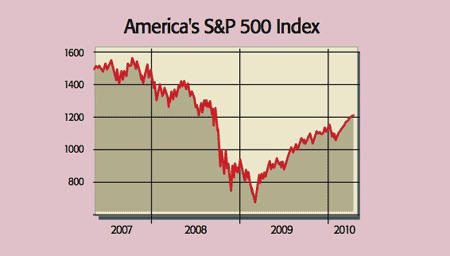
Until this week, equity markets appeared to have been in a “parallel universe” as Jim Reid of Deutsche Bank puts it. US indices, which set the tone for world markets, have been especially buoyant. They climbed for eight weeks in a row and are close to post-Lehman highs. Pan-Europe is still not far off 19-month highs and the FTSE 100 recently hit a 22-month high.
Sentiment has been wildly bullish, which often presages a market stumble. The latest Investors Intelligence survey of financial newsletters shows that 53.3% of those polled were bullish and only 17.4% bearish. That’s the lowest level of pessimism since 1987, which “wasn’t the most auspicious time to buy stocks”, says Alan Abelson in Barron’s. The April Bank of America Merrill Lynch poll of global fund managers also revealed widespread optimism, notes Kathryn Cooper in The Sunday Times. Cash levels are down to 3.5%. “Lack of cash is a correction signal,” says the survey.
So markets were displaying “irrational equanimity”, as Lex puts it in the FT. This week they got a wake-up call. The FTSE had its worst one-day fall in six months on Tuesday and eurozone stocks the worst this year. It’s become clear that the eurozone debt crisis is spreading rapidly amid a “complete loss of confidence” in peripheral European sovereign debt, says Jacques Cailloux of RBS. There’s plenty of hitherto ignored risk elsewhere too. China is tightening and financial regulation is also bad news for markets, as we noted last week.
Another key worry, says David Rosenberg of Gluskin Sheff, is the withdrawal of stimulus measures and eventual interest rate hikes, especially in the US, the world’s biggest economy. These include the Fed’s quantitative easing programme and housing credit. It’s hard to see the economy coping well, given that credit is still shrinking and private-sector wages are falling, once government handouts are stripped out. A renewed slide in the housing market won’t do anything to underpin consumption either.
Even if economies in the midst of fiscal squeezes can cope with rising rates, dearer money will hamper stocks. But if rates stay low it would imply “a very weak economy”. That means profits will disappoint, says Buttonwood on Economist.com. That’s not good for stocks either. So one way or another the sweet spot markets have been enjoying for the past few months – counting on both low rates and a strong recovery – will come to an end. Given all this, 2010 looks a good year to sell in May.